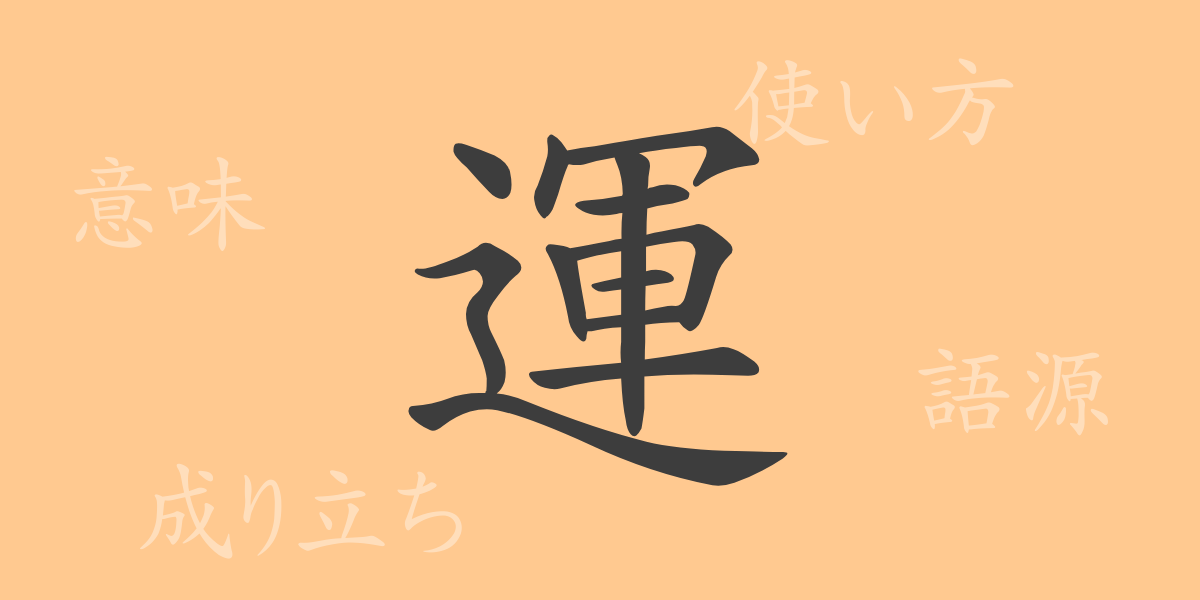“
The word “”運”” (un), which we often hear in our daily lives. How much do you know about this mysterious force that is said to influence our happiness or unhappiness, success or failure? In this article, we delve into the full picture of “”運””, from its origin to its meaning, usage, reading, and even compound words, idioms, and proverbs using “”運””. While exploring the world of “”運”” that is deeply rooted in the hearts and lives of Japanese people, let’s consider the value of “”運”” for us.
The Origin of 運 (un)
The word “”運”” can be traced back to Chinese philosophy and thought. It is said that originally, “”雲”” ( kumo) transformed into “”運””, and from the way clouds flow freely in the sky, it came to be used as a word expressing the natural flow of things. In Japan, it is often used in the sense of fate or fortune and is recognized as an irresistible force that affects people’s lives and daily events.
The Meaning and Usage of 運 (un)
The word “”運”” has multiple meanings. Generally, it often refers to the irresistible force that determines the good or bad luck in a person’s life or a certain period, or the workings of that force. Furthermore, it also has dynamic meanings such as the power to make things go smoothly or to transport things. In terms of usage, it is used in various contexts such as “”運がいい”” ( un ga ii, having good luck), “”運を天に任せる”” (un- wo -ten- ni -makaseru, leaving one’s fate to heaven), and “”運動”” ( undou, exercise).
Reading, Stroke Count, and Radical of 運 (un)
The basic information about the kanji “”運”” is as follows:
- Reading: The on’yomi reading is “”Un”” , and the kun’yomi reading is “”Hako-bu”” .
- Stroke Count: The stroke count of “”運”” is 12.
- Radical: The radical is “”辵”” ( shinnyou). 辵 means “”to walk on a path”” and is often seen in kanji related to movement.
Compound Words, Idioms, and Proverbs Using 運 (un) and Their Meanings
There are many compound words, idioms, and proverbs containing “”運”” in Japanese. Here are some examples:
- 運勢 (unsei): The good or bad luck in a person’s life.
- 運命 (unmei): The predetermined future in one’s life.
- 運転 ( unten): To operate and move vehicles or machines.
- 運命共同体 (unmei kyoudoutai): A group that shares the same fate.
- 不運 ( fuun): Bad luck. Being unlucky.
- 天は自ら助くる者を助く (ten wa mizukara tasukuru mono wo tasuku): A proverb meaning that heaven helps those who help themselves, not just relying on luck.
Conclusion on 運 (un)
The kanji “”運”” is a concept closely related to our lives, and its presence can be seen in many compound words and proverbs. Its usage is wide-ranging, from words referring to the grand flow of life, such as fate and fortune, to everyday actions like driving. Moreover, “”運”” as an uncertain element also serves as a motivation for us to make positive efforts. If this article has helped deepen your understanding of “”運”” and provided hints on how to deal with luck in your daily life, then it has served its purpose.
“

























